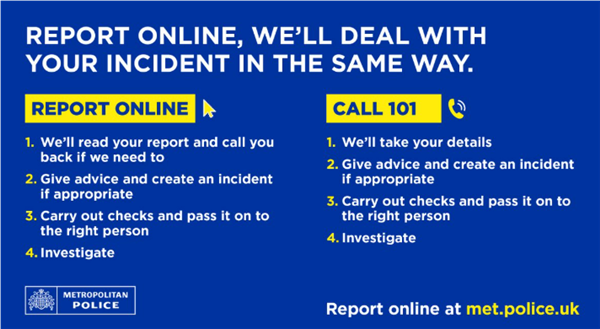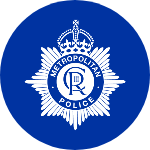|
Please review the following update regarding Anti Social Behaviour which some members around this area have highlighted as an issue of concern on the Met Engage priority survey.
Reporting crime and what happens after
To report a crime to the Metropolitan Police, you can use the following methods:
Call 999 for emergencies, such as if someone is in danger or a crime is in progress. A trained member of staff will ask you what happened and where you are.
Call 101 for non-emergency inquiries or minor crimes. You can also report online or visit your local police station.
Report online through the Metropolitan Police website for crimes that are not emergencies. - https://www.met.police.uk/ro/report/ocr/af/how-to-report-a-crime/
Contact Crimestoppers to anonymously report a crime or suspicious behavior. - https://crimestoppers-uk.org/
Make sure to provide as much detail as possible about the crime, including the location, time, and any witnesses. This information can help the police investigate and respond effectively.
But what happens after you report a crime ?
Every crime is different so every investigation is different, but any investigation starts with the same steps to make sure we have all the information we need. Below is an explanation on what happens after you report a crime, when you'll get a crime reference number and when we’ll contact you.
Assessing your report:
First, we’ll make sure that we’re the right police force to investigate the crime. For example, if it took place in a train station, British Transport Police (BTP) would be the right force; we'd send them your report and they'd investigate.
We’ll then look at the information we've got and decide if we can investigate your report further. If we decide we can't investigate your report, we'll contact you to explain why.
Our decision is based on four key factors:
vulnerability of the victim (eg is the victim in danger?)
seriousness of the crime
likelihood of solving it
best use of our resources
If we can investigate further, we'll take some initial steps.
These could include:
talking to witnesses
assessing the crime scene
checking CCTV or video footage
gathering other evidence such as forensic samples
searching our intelligence database (to see if other crimes have happened in the area, or if we hold information related to the case)
Find out more about forensic evidence.
After we’ve done an initial investigation
There are two possible outcomes:
We’ll close the investigation
We’ll move forward with the investigation
When we’ve made a decision, we'll contact you to let you know.
Closing an investigation
If we close the investigation, it’s probably because we've completed our initial steps and there are no other leads we can follow at that time.
Sometimes we get new information or discover new evidence, in which case we can reopen the investigation and update you.
Whether or not this happens, your report and the information we have is valuable. It helps decide where and when we use police resources to track down and prevent crime.
Moving forward with an investigation
We’ll assign an investigating officer to you. They’ll be your contact during the investigation, answering your questions and keeping you updated.
If you need to give a statement, they’ll talk you through it.
In the unlikely event you need to go to court, they’ll introduce you to a member of the Witness Care Unit who'll guide you through each step of the process.
Updating us on a crime
If you have new information or evidence about an existing crime, you can contact us to update an existing case or report online.
Requesting an update on a crime
If you want an update on a crime that's already been reported, contact us to request an update on a crime report online.
 Antisocial behaviour can come in many forms and can require support from more organisations than just the police. There are 13 different types of antisocial behaviour that we may be able to help with, including abandoned vehicles, littering or drugs paraphernalia and street drinking. A full list of what we categorise as antisocial behaviour is available on our website. If you have witnessed or experienced antisocial behaviour, you can report it online. If you ever experience this issue or have information regarding an incident, please report it using our online reporting tools at https://www.met.police.uk/, speak to an operator in our Force Communications Room via our online web chat or call the non-emergency number 101. Alternatively, you can stay 100% anonymous by contacting the independent charity Crimestoppers on 0800 555 111 or via their untraceable online form at crimestoppers-uk.org. Get Involved We are working on our brand-new strategy for how we police London and we want your help. Our New Met for London: Phase 2 strategy will guide how we deliver on behalf of Londoners over the next three years. Please consider getting involved by registering for these messages, this will enable you to contribute to the local priority survey. We may be unaware of issues that you would like us to focus on. Take a few minutes to securely and privately register and have your say using the button below, this will mean we can focus on things that matter to you. 
Please click here to complete the survey
| 





